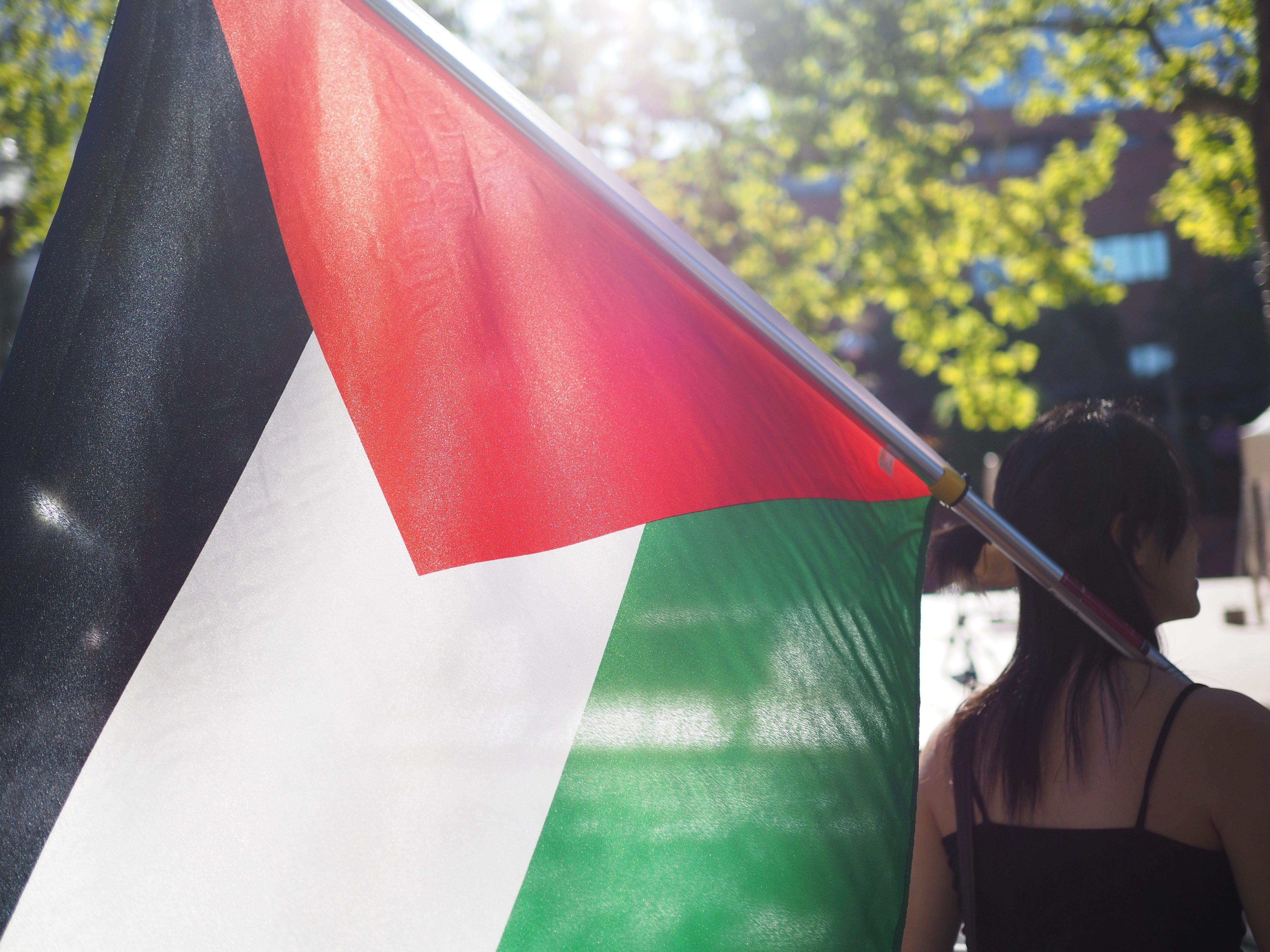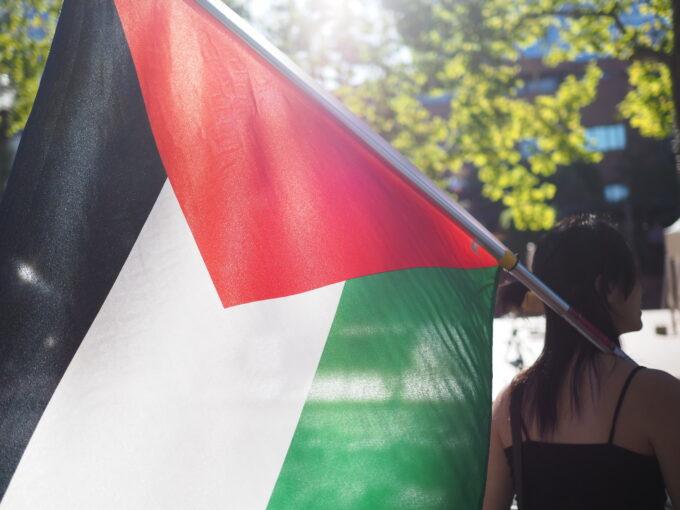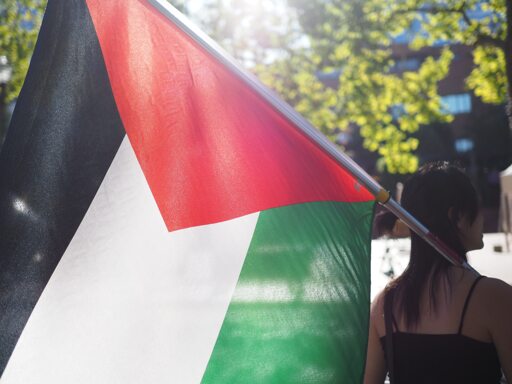

Photograph by Nathaniel St. Clair
The arrogance of colonialists and imperialists never changes. One need only look at the recent “stabilization” plan for Palestine to understand what I mean. The plan, which was approved by a United Nations Security Council (UNSC) unanimous vote (with China and Russia abstaining) is nothing more or less than a twenty-first century version of the western governments’ ongoing refusal to acknowledge the Palestinian right to a sovereign state. What officially began with the 1916 secret agreement to maintain colonial rule over Palestine between colonial France and Britain known as the Sykes-Picot agreement and evolved into the Israeli colonial-settler arrangement currently in place was just reaffirmed with the UNSC vote. If Donald Trump gets his way, this latest plan will bear his name and he will oversee it. Besides this and the moving of some borders, this newest agreement—which was made with little to no Palestinian input—is essentially the same as that 1916 agreement.
That is, essentially the same except for the added one hundred ten more years of Palestinian resistance to colonialism; a history of resistance that matters because of the lessons learned and the people who have carried it on. One of those lessons for the rest of the world, a lesson on which philosopher and author Hamed Dabashi begins his latest book with is that Palestine is a historic community composed of Muslims, Christians and Jews—all Palestinian and not exclusive to any religious or other particular group. In creating Israel, western colonialism has “planted its settler colony on historic Palestine.” Dabashi continues, writing that the idea of a Jewish state is as “untenable and violent as an ‘Islamic Republic of Palestine” or a “Christian Republic of Palestine.” The fact that the west has done this is purely to create a foundation for its colony in the region. This is clear when one objectively considers everything from the Sykes-Picot Agreement to the Nakba to the most recent United Nation Security Council’s “stabilization plan.” It only becomes unclear when one accepts the Zionist argument in all its forms.
Dabashi’s newest text, titled After Savagery: Gaza, Genocide, and the Illusion of Western Civilization, is a continuation of his ongoing contemplation of the creation of the “West” and its primary definition being one that exists only in its opposition to the rest of the world, especially those nations it has colonized, does colonize and hopes to colonize. It is based in white supremacy and the contempt that concept requires; a contempt that continues to be felt by non-white skinned humans around the globe, but most obviously and most brutally in the lands occupied by the Zionists in the name of western civilization. As for that civilization, the genocide of the Palestinians reminds the modern world exactly what it means. In what I consider to be a hopeful statement, Dabashi argues that the genocide in Gaza is the end, the “terminal state” of genocidal colonialism. My existence in the epicenter of that colonialism makes me considerably less hopeful in that regard. Nonetheless, we must continue to resist and continue to support the resistance in Palestine. It is certainly the epicenter of the resistance to genocidal colonialism in the current period.
In November 2023, four German intellectuals Nicole Deitelhoff, Klaus Günther, Rainer Forst, and Jürgen Habermas issued a statement in which they declared their solidarity with Israel, condemned the October 7, 2023 attack on Israel by the armed Palestinian resistance and rejected the idea that Israel’s occupation is genocidal in nature. In doing so, argues Dabashi, they have accented the essential racism of western philosophy; its arrogance in suggesting that the values it assumes are universal in nature and that it is western colonialism that defines the human soul and the human mind. The statement clearly states that Israel has the right to exist, but makes no such statement about the Palestinian people. As has been pointed out too many times to count by those who support the Palestinians in their resistance to the Israeli occupation, no state has the “right to exist.” That right is one to be claimed by a people and people, not by a political entity and certainly not by a colonial entity such as Israel.
I recently re-watched the 1982 Kassem Hawal film Return to Haifa, based on the story of the same name by Palestinian writer and freedom fighter Ghassan Kanafani. If one needs a reminder that the current situation is not unique but part of an ever longer history, I recommend you watch the film. It’s a beautiful film of a horrific story; a story of colonialism and imperialism in its genuine and most basic form. Likewise, so is a new collection of writing about the Gaza genocide just published by Verso. Titled Gaza:The Story of a Genocide and edited by Fatima Bhutto and Sonia Faleiro, this collection begins with a quick and concise history of the Israeli colonial settler state immediately followed by an essay titled “Hamas Contained: A History of Palestinian Resistance—an essay on the meaning of resistance itself in Palestine and the world.” There are poems, comics from Joe Sacco and essays both personal and political. One such essay by Mariam Barghouti reminds the reader that Gaza may be the part of Palestine currently being blown apart, but the West Bank is also seeing a dynamic upsurge in brutality and land theft. In that regard, Human Rights Watch recently reported that the January 2025 IDF operation called Operation Iron Wall has “emptied the camps in Jenin, Tulkarem, and Nur Shams of virtually all its residents, making it the largest displacement of Palestinians in the West Bank in one operation since the 1967 war. Ten months later, the camps remain empty with approximately 32,000 residents displaced. Since then, the Israeli military has demolished 850 homes and other buildings across all three camps.” (“All My Dreams Have Been Erased.” https://www.hrw.org/report/2025/11/20/all-my-dreams-have-been-erased/israels-forced-displacement-of-palestinians-in-the) Another essay features an artist and teacher discussing the destruction of an art institute in Gaza and yet another the ecocide perpetrated on the land. Perhaps the most difficult piece to read is titled “On Losing my Family—And My Mind”; the title says it all.
As the world watches, the historically colonial governments of the global north are working overtime to maintain the colonial-settler state of Israel. While the IDF violates the latest ceasefire Donald Trump champions as if it were the birth of Christ, the United Nations Security Council passed what it calls a stabilization plan that is little more than an attempt to legalize the gains of Israel’s destruction of Gaza and make them permanent, all under the direction of the world’s most destructive power, the US government. The apparent cooperation of the Egyptian regime and the sheikhdoms in this repackaging of the occupation, while not surprising, makes it clear that it is the Palestinians and their supporters around the globe than can truly free Palestine. We must not allow those who want the idea of Palestine to be eliminated their victory. These two texts help explain why.
The post Palestinian Liberation, Not Imperialist “Stabilization” appeared first on CounterPunch.org.
From CounterPunch.org via this RSS feed


